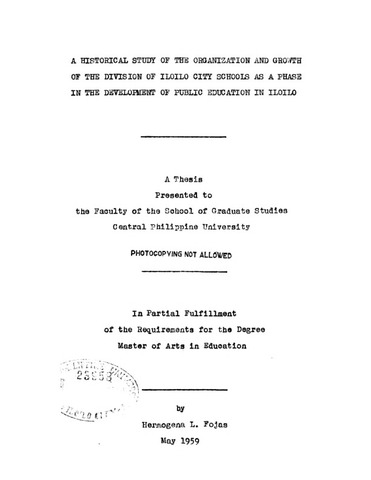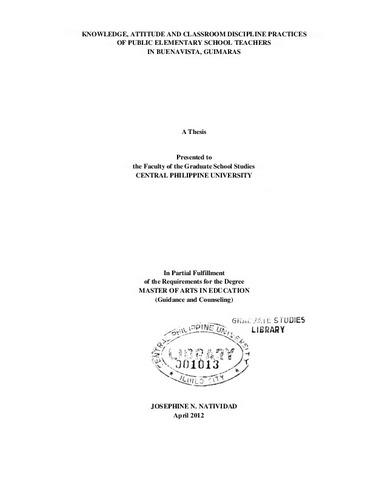The role of elementary school principals as perceived by principals, teachers, the community power-structure and supervisors

Page views
512Date
1971Author
Thesis Adviser
Defense Panel Chair
Defense Panel Member
Share
Metadata
Show full item record
Abstract
Generally, this study aimed to find out the duties of the elementary school principal as an educational leader of the community in which he is teaching. It was limited to the study of the external administrative duties of public elementary school principals. More specifically, the purposes of this study were to ascertain (1) the common trend of opinion of the different publics of a principal, such as the teachers, laymen and supervisors, and the principals themselves on what they expect the principals to do as their administrative duties; (2) the trend of opinion of teachers, laymen, supervisors and the principals themselves on what duties are considered important by them; (3) the common observations of teachers on what their principals were doing; (4) the duties commonly ranked important by teachers according to their observations of their principals; (5) the common trend of opinion of the four groups on what they expect the principals to do as their external administrative duties; 1 2 (6) to what extent the trend of opinions of the four groups relate to one another; (7) which duties should be done by the principals, by other school officials, and by both the principals and their subordinates; (8) to what extent the trend of opinions of the principals, teachers and the community power-structure relate to one another on the responsibilities of principals; and (9) to what extent the observations of teachers and the expectations of the four groups on the external administrative duties of principals are related .
The universe of the study is Antique. The public elementary school principals were the subjects of the study. It included also three of their publics -- teachers, supervisors of the school year 1969-70 and the community power structure in the districts of Libertad, in the northern area, Sibalom, in the central area and Dao, in the southern area, which were chosen to represent the whole universe.
The research survey was utilized as a method of procedure in this study. The normative survey was adopted with the questionnaire as the main instrument.
Two hundred ninety-one questionnaires out of three hundred eight questionnaires, or 94 per cent of the questionnaires sent, were returned. These were distributed as follows:
Eighty-four out of the ninety of the teachers, or 93 3 per cent, who answered on their observations; eighty-eight teachers out of ninety, or 98 per cent; thirty-two out of the thirty-five principals, or 94 per cent; three supervisors or 100 per cent; and eighty-four laymen, or 93 per cent. From the percentage of the returns, it could be safely said that the sample was representative of the population.
The chi-square was computed to find out whether there was significant divergence of the teachers' observations from expected frequencies calculated on the null hypothesis of equal probability and the trend of opinion of the teachers principals, and laymen on their expectations of the external administrative duties of principals. The chi-square was computed also to find out the relatedness of the opinions of the principals, teachers, and laymen on the responsibilities of both the principals and other school officials.
The weighted scores of the items were computed to find out the ranking of items by teachers, principals, laymen and supervisors on their expectations of the external administrative duties of principals.
The rank coefficient correlations (Rho) was computed to show the correlation of the ratings of the importance of the duties. The z-value was computed to test the significance of the Rho. In general, the teachers were agreed on their observations on all the forty-one duties. Thirty-nine duties, or 4 97 Per cent, were ranked on the “important level” and two duties, or 3 per cent, of "less importance."
Generally, the teachers were agreed on their expectations on all the forty-one duties. The divergence of opinion on thirty-seven duties, or 90 per cent, were towards the "important level," four duties, or 10 per cent, towards the "unimportant level." The community power-structure were agreed on their expectations on thirty-eight duties, or 93 per cent; on thirty-eight duties, their opinions diverged towards the "important level;" four duties towards the "unimportant level." The principals were agreed on thirty-five duties, or 85 per cent; the divergence of their opinions on thirty duties was towards the "important level" and four duties towards the "unimportant level."
The three groups were agreed that the twenty-seven duties, or 66 per cent, were important and two duties, or 5 per cent, were unimportant. In general, there seems some amount of disagreement on the importance of the external administrative duties as perceived by the three groups, who differed in opinion in twenty-nine per cent of the forty-one duties. The lack of trend of opinion on these duties leaves much to be desired. Generally, the principals believed that seven duties, or 17 per cent, should be done by principals; the teachers, twelve duties, or 30 per cent; the laymen, twelve duties or 5 30 per cent. The teachers and laymen believed that two duties, or 5 per cent, should be done by other school officials.
The principals, on the other hand, believed that none should be done by other school officials. The principals were agreed that twenty-one duties, or 69 per cent, should be done by both the principals and other school officials; the teachers, twenty duties, or 49 per cent; and the laymen, twenty-five duties, or 61 per cent.
The three groups were agreed on who should do twenty five duties, or 61 per cent of the forty-one duties. They were not agreed on sixteen duties, or 39 per cent. There was an evidence of relatedness.
The correlation between the observations of teachers and the expectations of the teachers was high; the observations of teachers and expectations of principals, marked; teachers' observations and laymen's expectations, marked.
While each public when taken as a separate group has a more or less uniform perception as to (a) importance, (b) expectations and (c) responsibilities, yet if the three groups were compared, there was limited agreement of opinion among them. In other words, there is more disagreement among the groups than is desired.
As revealed in the background of the principal, he needs to spend more time on his external administrative duties, if he is to provide dynamic leadership in his community.
He has to take more graduate courses which could be of great help to him. There is a need for reorientation on the part of the principals, teachers, laymen as to the administrative duties of principals so that they shall understand these duties more fully.
Description
Abstract only
Suggested Citation
Autajay, E. G. (1971). The role of elementary school principals as perceived by principals, teachers, the community power-structure and supervisors (Unpublished Master's thesis). Central Philippine University, Jaro, Iloilo City.
Type
ThesisSubject(s)
Keywords
Department
School of Graduate StudiesDegree
Master of Arts in EducationShelf Location
GSL Theses 378.242 Au81
Physical Description
xiii, 237 leaves
Collections
Related items
Showing items related by title, author, creator and subject.
-
Teacher - Librarian Collaboration (TLC) among selected catholic secondary schools in Iloilo City: A basis for a proposed library instruction program
Sefil, Margarito S. (2018)This is a quantitative research which aimed to determine the level of TLC and the factors associated with it among the Catholic secondary schools in Iloilo City. It utilized self-administered survey instruments for teachers ... -
A historical study of the organization and growth of the Division of Iloilo City schools as a phase in the development of public education in Iloilo
Fojas, Hermogena L. (1959)This thesis is the report of a study of the organization as well as the growth of the Division of Iloilo City Schools as a phase of public education in Iloilo for a period of five years. The study covers the period from ... -
Knowledge, attitude and classroom discipline practices of public elementary school teachers in Buenavista, Guimaras
Natividad, Josephine N. (2012)Classroom discipline is the process of correcting and moulding the mental faculties and moral characters of pupils inside the classroom. Teachers are the main actors in imposing classroom discipline. The success of the ...




